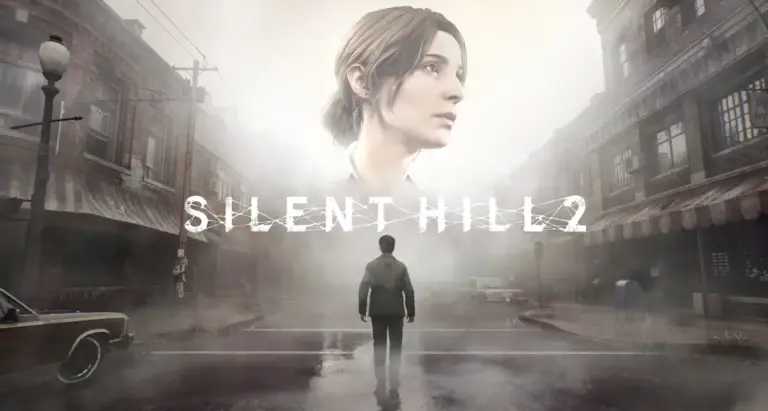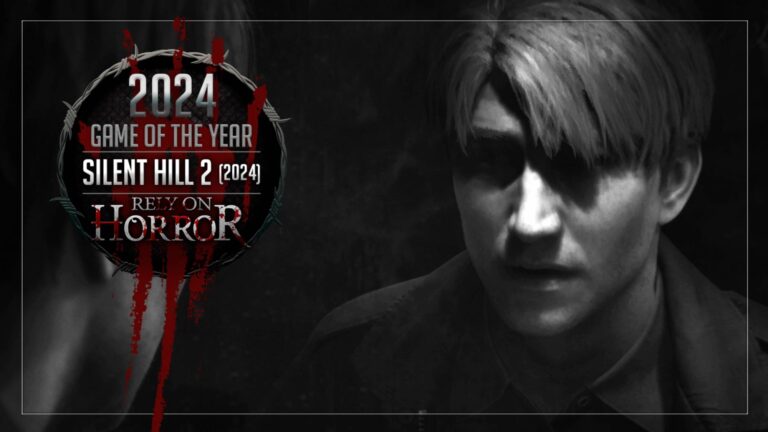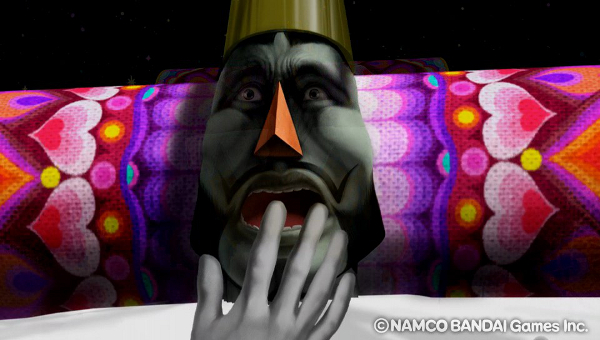
The Katamari Damacy games are well known as some of the oddest and goofiest games out there. The series’ strange characters, catchy Japanese songs, and cute art style are the things that come to mind when the series is mentioned, but what if I told you that these elements hide something more sinister, more nefarious than one would think? What if I told you that Katamari Damacy was an evil series that plays on the player’s own insecurities as well as objectifying them to demeaning task in order to please a false God? Katamari Damacy is in fact a horror series, allow me to tell you why.
When the original Katamari Damacy released on the Playstation 2 in 2004 I did not know whether I would enjoy it or not. I borrowed the game from a friend instead. Instantly, I understood the appeal of the game; it was charming and unique. Although I had lots of fun playing it, I was too young to see the darkness that festered beneath the pastel colors and catchy music. With the launch of the Playstation Vita, I decided to finally purchase a Katamari game for myself. There had been several releases before Touch My Katamari but I had heard they were mostly the same in terms of level design. So, I was in a prime opportunity to get back into the series that had charmed me when I was a child.
Touch My Katamari takes the familiar formula of past Katamari games but gives the player a story to follow. The game starts with a family taking a walk through a town. When the small child of the family raises the question of who is more awesome, the King of All Cosmos or his school principal, the King becomes distraught at the idea that he is as awesome as a mere principal. This sends him onto a familiar path of self loathing and domestic abuse.
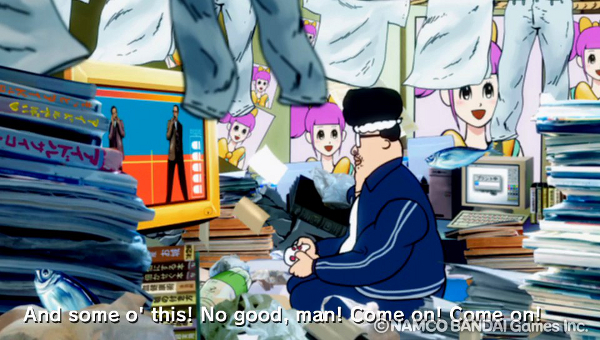
As players go through the various story missions of Touch My Katamari, they slowly reveal the story of a geek Otaku by the name of Goro. Goro is an overweight, acne faced introvert who prefers gaming and anime over school work and social interaction. Story missions slowly reveal Goro’s struggle to get his priorities in life settled and become less of a loser. Goro finds it difficult to study his school work because gaming and other geeky things continue to call him back into a life of self fulfillment and entertainment gluttony. When the player completes the last mission of the game, it is shown that Goro’s act of denying himself of his familiar pleasures has propelled his life forward out of the abyss that is being a geek. Goro goes on to graduate from school, lose weight, get a great job, and then start a beautiful family. Goro has become a better person because he quit his geeky habits.
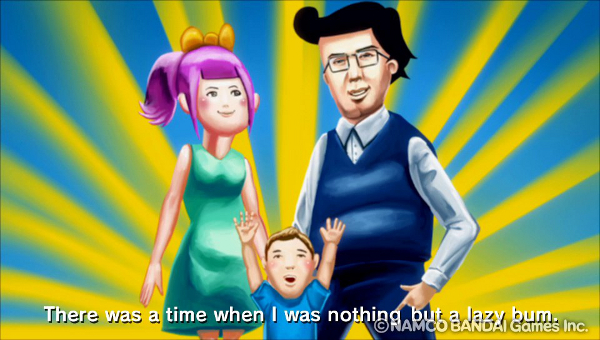
What Touch My Katamari has done is break the fourth wall in order to send a message to the player: that they are losers. Why would this game outright show you a geek gamer can make something of himself if he quit his hobbies? Because this game wants you to hate yourself. Unlike Goro, you will not be successful until you stop playing games, nor achieve the level of looking suspiciously like Nicholas Cage.
Touch My Katamari practices the art of stripping you of your self-esteem. The dark agenda is not only apparent in the story mode which follows Goro, but also the King of All Cosmos’ most recent fit of self loathing. Along with Goro’s story, the King of All Cosmos sends Prince off to do his bidding once more. This particular incident is sparked by the humans thinking less of the King as of late. Many think that he has lost his luster; the King can’t stand to be criticized. Each mission is completed in order to impress another human being with the King’s powers–although it is you the player doing all the work as the Prince.
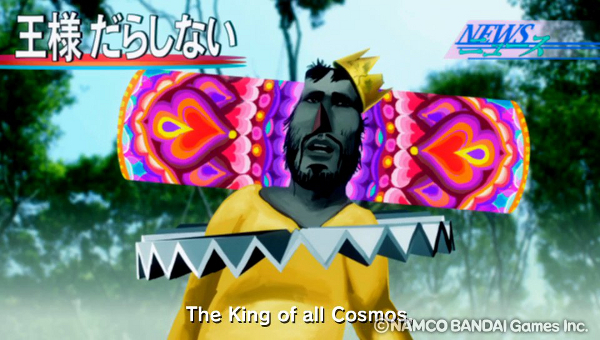
As the Prince, you are given the task of going to Earth and rolling up objects with your Katamari. Many missions are catered to the specific agenda of the human who has assigned the task–most tasks are done simply to please their superficial desires. Once on Earth, the Prince has to roll up objects, which includes people. The King has sent you, his son, to Earth in order to impress those who doubt his power. While it is not outright stated within the story that the Prince has to kill in his father’s name, it is very apparent once the people of Earth start to scream as the Katamari approaches them–the whimsical music is meant to mask their cries.
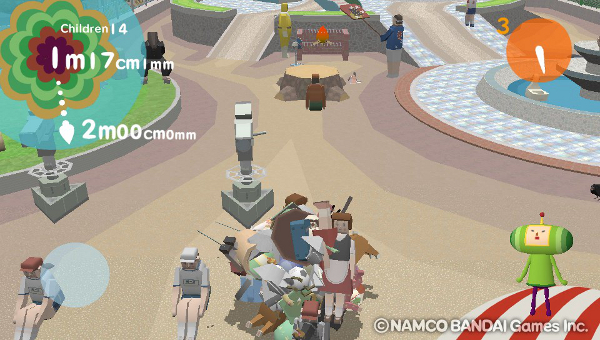
The Prince is a messenger of death, a child so determined to gain his father’s love that he captures people and their homes, and allows them to be burned to death to become a star in space. All of this just to make his father proud. He’s no king, he is a monster.
The worst part about the genocide on Earth would have to be that the humans still worship the King. They have been indoctrinated into believing that he is their savior and almighty God. They know nothing better than to worship this demon. Their minds are clouded by lies and fear. They live in a world under the harsh control of a mad beast who thinks nothing but himself.
Despite doing the King’s bidding, he constantly berates the young Prince along with you, the player. Under-performing on a mission leads to a stark, terrifying expression of hatred on the King’s face. You have failed him and you better try again or he will be “disappointed”.
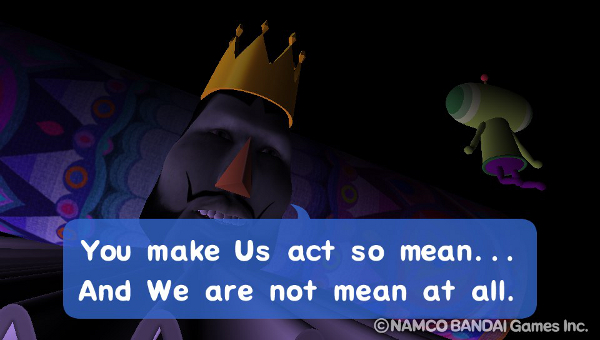
The berating is so subtle, so muted by the game’s cheery theme that it successfully burrows into the back of your mind and allowed to spread like necroses. Something as simple as the mission complete screen targets the player’s self-esteem. Instead of being given the option to exit or say no to replaying a successfully completed mission, the King asks if you would like to retry or quit. The word quit is powerful as it implies that the Prince did not do well enough. You did not do well enough. No matter how well you did on that mission or what praise you had finally received, the King will not allow room for you to feel like you have accomplished enough; he demands more and more from you!
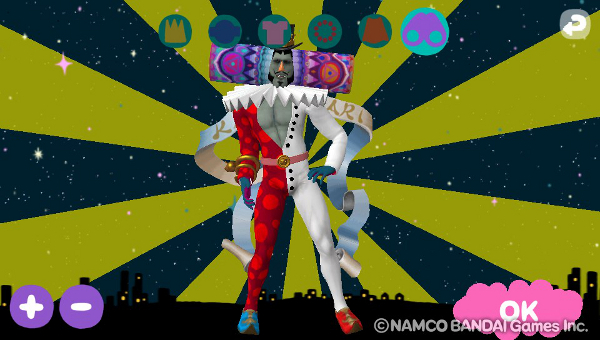
The King is a flamboyant bastard of a God. He goes about making himself feel better by using his child to do his dirty work. He is a coward, a beast with no soul. He is the kind of person that would look upon his reflection with disgust and blame his child for his own problems. The King is an abusive parent that is guilty of numerous sins: envy, vanity, and sloth.
Once in a while, the King will tell the Prince that the local store is having a sale on clothing. The King will outright beg for something that he has had his eye on. If the Prince buys him the item, the King promises to be proud of him. The King trades what he knows his son craves for material possessions. It’s a vile and manipulative tactic. This act also tricks the player into spending hard earned candy (the game’s currency) on frivolous things. This is blood candy tainted by the death of innocents.
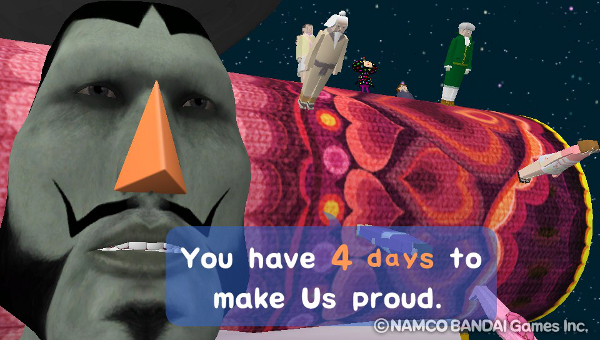
The Prince’s cousins obviously fear the King, as all can be found on Earth, hiding within the game’s various levels. They’re hiding from him. It’s no wonder that the Queen of All Cosmos rarely appears. Years of living with a monster has drained her of all her will to fight. She is nothing but a husk, a broken being, another victim to the King’s dark hold over Earth and the Cosmos. The royal dieties of the Cosmos are not all evil. Like us, they are capable of great good and great evil. The King’s evil has beaten all of the good that is left. His reign of terror may end in the future, but for now, the Prince, his cousins, and the people of Earth must endure living under his tyrannical rule.
Touch My Katamari employs the most powerful type of horror: psychological. It slaps you in the face with messages that call you out on your gaming habits and skills. It puts you in the tiny shoes of a child so desperate for his father’s love that he would destroy homes and kill innocents on numerous occasions. Heed my warning when I tell you that Touch My Katamari is a horror game concealed in a cute package. Namco Bandai, I’m onto you.

You should also check it out because it’s pretty awesome.

